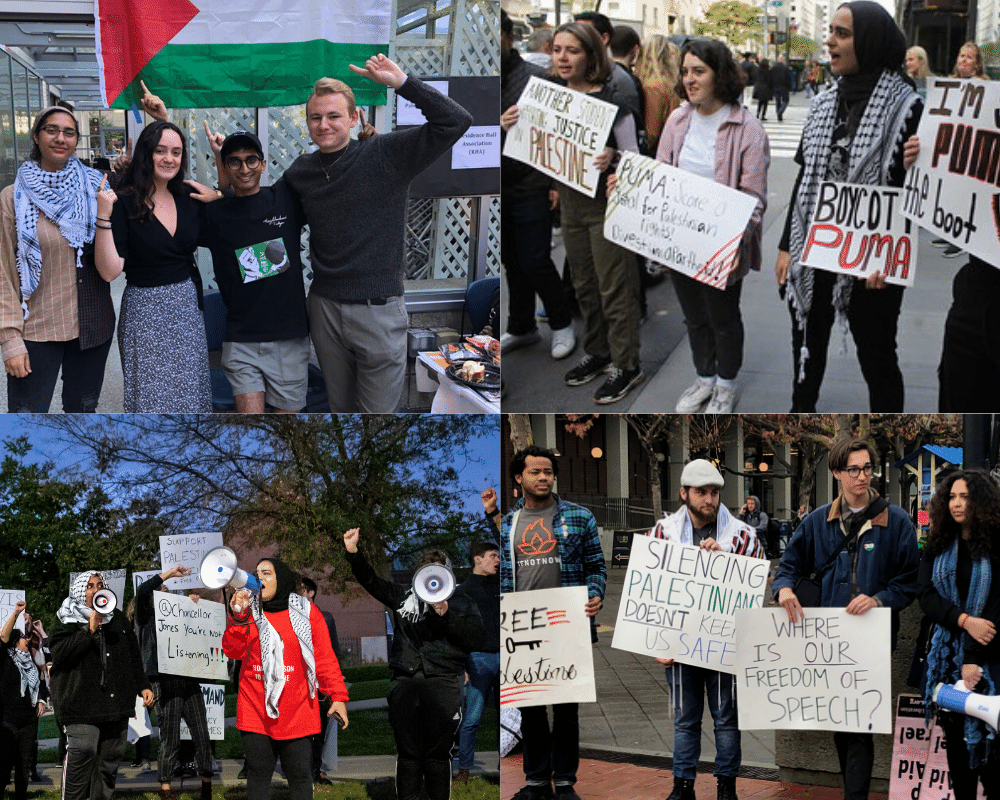2019 in Review: Intensifying Censorship Efforts Fail to Thwart Thriving Movement
/From top left: Students and youth activists from fordham university, new york city, the university of illinois urbana-champaign, and uc berkeley. (Credit: Fordham SJP, Joe catron, uiuc SJP, palestine legal)
Palestine Legal Responds to Nearly 250 Attacks on Palestine Advocacy in 2019—Almost 1,500 Since 2014
In the run up to what activists are calling Trump’s “Steal of the Century,” 2019 witnessed growing efforts by the Trump administration, in line with its foreign policy, to silence advocacy for Palestinian freedom.
Palestine Legal just released a new report analyzing attempts to censor the U.S. movement for Palestinian rights in 2019. While efforts to silence the movement intensified from public officials and institutions, activists pushed back, winning key victories on campus and in court.
Palestine Legal responded to 247 incidents of suppression of U.S.-based Palestine advocacy over the course of 2019, totaling 1,494 suppression incidents between 2014 and 2019. The incidents included discrimination, baseless legal threats, disciplinary investigations, censorship, and false accusations of antisemitism.
The report highlights a number of trends in the suppression incidents Palestine Legal responded to in 2019:
University students and faculty were targeted in 74 percent of the incidents.
Nearly half the incidents involved false accusations of antisemitism due solely to activists’ support for Palestinian rights.
Nearly one-third of the incidents involved false accusations of support for terrorism.
There was a sharp increase in the abuse of federal civil rights complaints as a tool to silence campus Palestine advocacy.
At least eight complaints were filed against universities under Title VI of the Civil Rights Act in 2019 alleging that Palestine activism created an antisemitic environment, compared to two complaints reported to Palestine Legal in 2018, and no complaints reported between 2015 and 2017.
At least 19 bills were introduced at the state and federal level targeting the movement for Palestinian rights.
Mississippi adopted a new law against boycotts for Palestinian freedom, making it the 27th state with an anti-boycott measure, and Florida adopted a controversial definition of antisemitism aimed at silencing criticism of Israel.
An executive order in December adopted this distorted definition long pushed by Israel advocacy groups that portrays criticism of Israel as a form of antisemitism. The order was one reason for a rise in complaints about campus activism.
Other federal interventions included Department of Education investigations at Duke and UNC Chapel Hill, threatening the schools’ Middle East Studies programming with funding cuts.
As in recent years, 2019 also witnessed attacks on women of color such as Angela Davis, Ilhan Omar, and Rashida Tlaib for their support for Palestinian rights.
High profile court cases in 2019 included a lawsuit against the University of Massachusetts Amherst trying to stop an event about censorship and alleging discrimination against Jewish students, which was ultimately dismissed.
Students, represented by Palestine Legal, the Center for Constitutional Rights and co-counsel Alan Levine, also won their lawsuit against Fordham University when a court ruled that the university’s ban of a Students for Justice in Palestine club was unlawful.
Students faced disciplinary investigations and dishonest condemnations for protesting Israeli soldiers at Arizona State University and racism from anti-Palestinian speakers at Bard College.
High school students also faced backlash, including in California where a student was told he could not write a report about the boycott of Sabra hummus and was subjected to a racist tirade by his teacher.
Students also achieved major victories, including a push by students at the University of Illinois Urbana-Champaign (UIUC) to adopt a student government resolution condemning efforts by their university to conflate Palestine advocacy with antisemitism.
View the full report here.
Contact us if you are interested in reporting about these suppression efforts. And reach out if you are facing suppression in your own Palestine advocacy.


